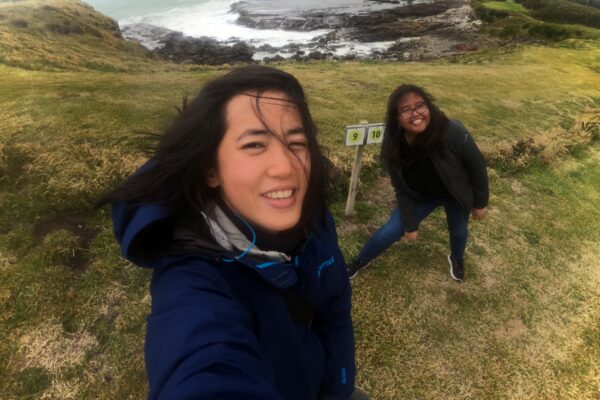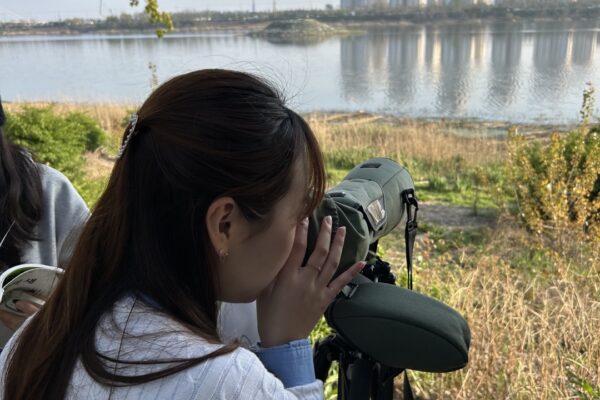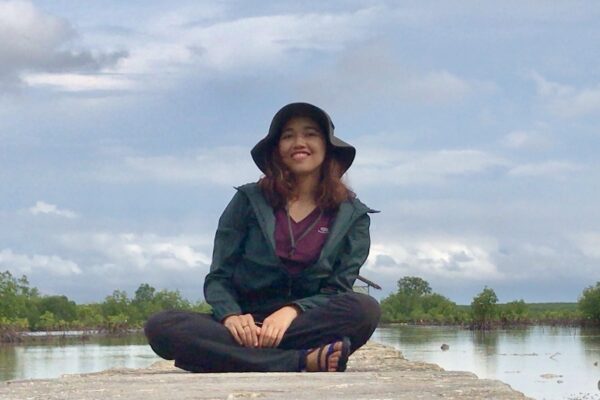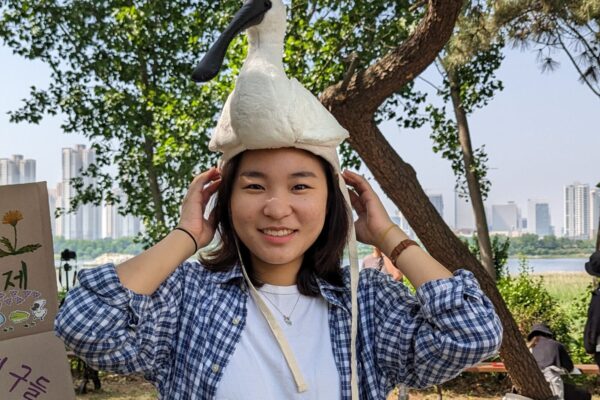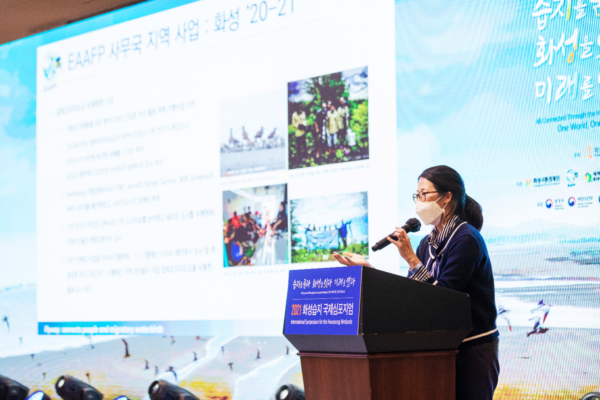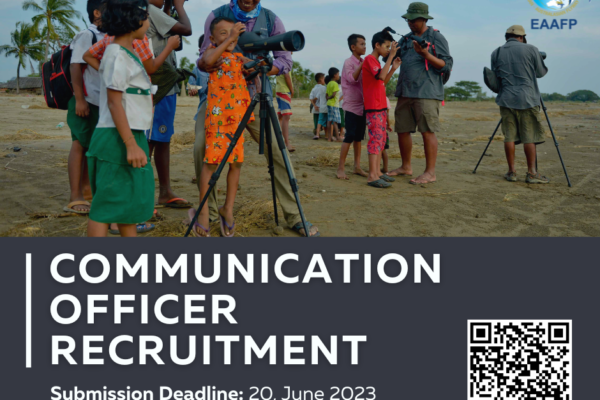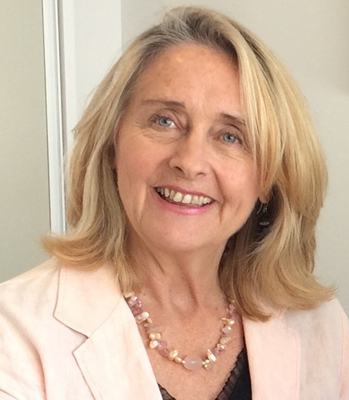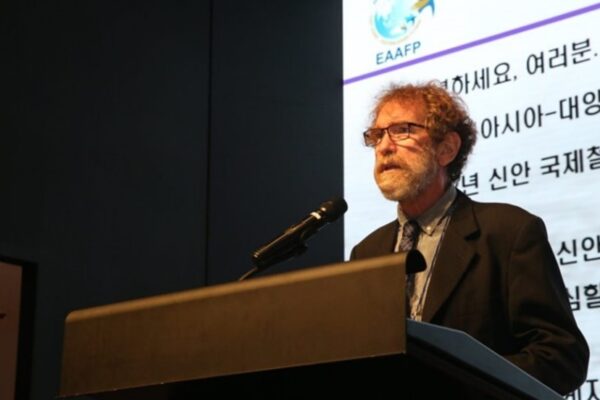-
EAAFP welcomes new Communication Officer: Wen Qing Ng
© Wen Qing Ng The East-Asian Australasian Flyway Partnership welcomes a dynamic addition as Wen Qing Ng joins the Secretariat as the Communication Officer, infusing a new dimension into the arena. With a profound interest in wildlife conservation and biosecurity projects, her unique perspective and diverse background spanning over a decade promise to breathe fresh energy into the field. Originating from Malaysia, Wen Qing brings a unique perspective shaped by the rich cultural diversity of her homeland. Her firsthand understanding of the challenges involved in fostering environmental responsibility within varied populations has ignited her passion for effective communication. This journey led her to pursue a postgraduate degree in Science Communication at the New Zealand's University of Otago. Here, she cultivated skills in multimedia storytelling, skillfully blending the realms of art and science. Her proactive involvement in an international research unit further underscored her ability to communicate complex concepts through a variety of media. © Wen Qing Ng A notable highlight in Wen Qing's career is the creation of the documentary "Kauri K9s." This compelling production sheds light on training sniffer dogs to combat kauri dieback, a critical threat to New Zealand's conifer species. The success of this endeavor showcases her prowess in weaving scientific information with engaging narratives drawn from local communities. However, Wen Qing's communication prowess extend beyond the surface. She recognizes that effective communication involves not only aesthetics but also addressing the fundamental "why" and reaching the right audience. Her experiences collaborating with avian experts and enthusiasts within international organizations during her undergraduate years have honed her strategic communication skills, setting her apart as a versatile communicator. Amid the unprecedented challenges posed by the pandemic, Wen Qing's adeptness in planning and execution shone brightly. By the close of 2022, she successfully completed her Master of Science Communication, specializing in Science and Natural History Filmmaking, demonstrating her resilience and commitment to her pursuits. In her role as Communications Officer, Wen Qing is poised to champion the causes of biodiversity and community well-being through innovative communication strategies. Her vision extends beyond mere metrics, understanding that true impact is measured by tangible progress. With her on board, the science communication landscape gains a dedicated advocate for wildlife conservation and biosecurity, with a unique blend of creativity and strategic thinking. As we extend our warmest welcome to Wen Qing Ng, we eagerly anticipate the positive influence she will bring to our shared endeavors.
Continue reading -
Farewell to Yeji Park, Administration and Finance Assistant
© EAAFP Secretariat In the words of Yeji Park, "Working at an international organization like EAAFP was one of my desires as a student who studied international trade and international relations. At first, as a person who did not major in the field of environment, all the topics we are dealing with here were too unfamiliar to me. Trying to participate in birdwatching and operating our booth at external events naturally made me feel confident and the interested in this field. Also I believe that I acquired valuable skills and experiences that enriched both my personal and professional development. © EAAFP Secretariat One of the primary tasks I undertook was managing the procedures for overseas transactions including Small Grant Fund 2023. Through this task, I was able to gain a profound understanding of financial compliance, and an experience instilled in me a strong sense of responsibility and attention to detail, ensuring that each transaction was executed accurately and efficiently. Another vital aspect of my role was writing a meeting minutes of the Financial Sub Committee, and creating admin-related documents such as certificates of internship, volunteer etc. Since those tasks needed the capture of essential discussions from the whole conversations from the meeting and providing accurate information, I was able to maintain consistency in formatting and content and emphasize the importance of clarity. Also, I operated the booth during external events, it provided me with a unique opportunity to engage with diverse stakeholders. This experience fostered my ability to represent the organization effectively and build meaningful connections with visitors. © EAAFP Secretariat Overall, my time in the secretariat taught me invaluable lessons in time management, organization, and teamwork. It developed me with problem-solving skills, remaining adaptable in the face of various tasks. Moreover, I learned to appreciate the collective efforts that drive success in an organization. Through my internship, I not only deepened my knowledge of administrative and financial functions but also essential skills such as communication, putting emphasis on detail, and adaptability. These experiences have made a strong foundation for my future endeavors and a sense of confidence and readiness to tackle complex challenges working in an organization."
Continue reading -
Saying Goodbye to Ms. Vivian Fu, Senior Communication Officer of EAAFP Secretariat
With a mix of fond memories and deep appreciation, the EAAFP Secretariat is preparing to say goodbye to Vivian Fu, their esteemed Senior Communication Officer. Over the past five years, Vivian has wholeheartedly dedicated herself to the mission of protecting migratory waterbirds and their habitats in East Asian-Australasian Flyway. As she moves on from her position, it is important to reflect on the incredible achievements she has made during her time with the Secretariat. In this special interview, we explore the meaningful experiences and valuable insights that have shaped Vivian's journey within the Secretariat. From her humble beginnings to her most cherished projects, this article offers a glimpse into the person behind the role and the significant impact she has had on the EAAFP. Join us as we celebrate Vivian's determined spirit, her impressive accomplishments, and the enduring legacy she leaves behind at the Secretariat as she embarks on a new professional chapter. Question: Hi Vivian, you have been with the EAAFP Secretariat for about 5 years, but now you are leaving, how do you feel? Answer: It's a bit of a mixed bag for me because I've been here for nearly five years, gaining loads of valuable experience. I've built up some great connections and friendships in Korea and within and beyond the Flyway, so it's sad to say goodbye to our Partners, collaborators, local friends, and all. The Secretariat also granted me invaluable experiences in different perspectives, meeting and reaching out to many people. I was always impressed by the passion of people, and it was an amazing time working with them. Yet, I am sure that these friendships and experiences will be continued as I will work in the conservation field, and that we will meet again or work together at some point in the future! But, at the same time, the more I worked, the more I realized there are still a lot of things I don’t know and lacked skill and knowledge. So, it's time for me to shake things up, try something different, and embrace new opportunities to learn and grow. Question: Going back to the beginning, what made you have an interest in migratory birds and conservation works? Answer: I think my love for animals started when I was little. As a kid, I used to go hiking with my family and watch documentaries about animals, which really sparked my interest. When I got to university, I chose to study ecology at the University of Hong Kong because it was the only subject that allowed me to focus on terrestrial ecology, which I was fascinated by. When I was young, I had this simple dream of saving the Giant Panda because they are cute. I also need to thank my teacher, Dr. Billy Hou, for organizing activities outside of class, where my classmates and I got to explore various things like bird watching, plants, amphibians, reptiles, butterflies—you name it. The wonders of the natural world truly amazed me. I came to understand that while the Giant Panda had plenty of people looking out for them, other animals like birds, amphibians, reptiles, butterflies, and plants received relatively less awareness and needed conservation attention too. That's why I shifted my focus to working on different animals. I actually started my career studying amphibians and then moved on to birds. It felt like a meaningful way for me to engage and contribute to the world of conservation. Even in urban areas like Hong Kong, I can still find animals, birds, and amphibians surviving in small pockets of natural habitat. I'm always amazed when I step outside my home on rainy days and hear the calls of frogs, knowing they're surviving underneath the concrete-paved roads. It just goes to show that no matter where you are, there's always something you can do to help protect nature. With my background in ecology from university and my expertise as an ecologist, I truly grasp the importance of habitats and the environment for the well-being of the animals I love. These growing interests in conservation work have become an integral part of who I am. It's a common trajectory—getting to know these animals, falling in love with them, and feeling a deep desire to protect and conserve them. Question: Then, what brought you to the EAAFP Secretariat and what was your motivation? Answer: Well, I've actually been tagging along with the conservation of birds for a while now. I spent a good 8 years working on bird conservation before joining EAAFP. Back then, I was involved in a joint programme on bird conservation in China, working alongside the Hong Kong Bird Watching Society and BirdLife International. There were projects to conserve endangered bird species such as Spoon-billed Sandpiper, Chinese Crested Tern, Yellow-breasted Bunting, etc, and all the time working with local communities. Over the years I realized how crucial it is to engage people and convince them to support conservation efforts. That's why I believe in the significance of CEPA (Communication/Capacity Building, Education, Participation, and Awareness) work, that it should be merged at every levels, even though its impact may take some time to show. So, when I heard about the position of Communication Officer at EAAFP and the work will be focusing on CEPA, I felt this might be where I could explore and devote more energy to messaging the importance of the conservation of birds and bringing people to work together. I saw the need for more effort in CEPA in conservation, and I wanted to learn and dive headfirst into that realm of work. That's what keeps me motivated. Question: I think CEPA activities would be possible in other countries, would working in EAAFP make any difference? Answer: Actually, what I'm really excited about is EAAFP itself. It's on a whole other level compared to my previous focus on just one country or region. With EAAFP, we're talking about a Flyway scope, where things operate on a much grander scale as well as the impact is wider. Working here gives me international experience and allows me to see things with a wider vision, and I could work with the government, leading conservationists, scientists, and people with different backgrounds. It allows me to understand more about the systems and mindsets of government, IGOs, and international and local NGOs. I found that many times that people are interested and willing to support conservation actions when they understand the needs, it is then our role to find out ways for them to facilitate, and keep encouraging. Question: I believe the Communication Officer and Communication Team are doing a lot for CEPA activities. What are the most interesting/memorable CEPA activities you have worked on so far? Answer: That’s a difficult question, too many memorable activities, such as organizing MOP10 and MOP11! One thing I am thankful to the Secretariat is the freedom to explore things. I enjoy exploring different avenues and reaching out to new collaborators. One particular project that stands out of my mind at the moment is the Flyway Youth Forum. It all began in 2020, right around the time when COVID started. This experience really showcased how strong the partnership of EAAFP was and how far a collaborative action can bring us. As the work plan adopted in MOP10, we need to organize a youth forum, so I started reaching out to people for ideas. Chris Rostron from WWT introduced me to Youth Engage in Wetlands (YEW) from the Ramsar Convention, and later on the concept of the first-ever Flyway Youth Forum was developed. There were lots of challenges, especially during the Pandemic period and we got to adapt to new technologies. But, oh boy, there were quite a few challenges along the way. The pandemic made everything even more difficult, especially as we had to adapt to the online environment and learn about online technology. But after 6 months to prepare for the two-weekend activities, the outcomes of the Flyway Youth Forum were great and exceeded our expectations. We had over 130 participants and more than 80 young leaders, with many of our Partners and collaborators supporting and participating. We drew inspiration from the energy of the young people and their passion for doing things at a high standard, and we heard their desire to engage more in conservation and need for capacity building. After the Flyway Youth Forum, we learned that East-Atlantic Flyway Youth Forum was established too. Now, we're even dreaming of a joint Flyway Youth Forum encompassing the entire world's flyways. It's still a dream, but it's great that we've initiated this conversation. Following the Flyway Youth Forum, we launched the Youth Think Tank Competition, which led to more conservation actions by youth. And wonderful things were these endeavors continued to foster discussions with our Partners, culminating in the development of a decision paper “Youth Mainstreaming in Flyway”, including establishing a Youth Task Force. All of these experiences have been incredibly valuable for me. It has been an exciting journey for me to witness within EAAFP, that the immense energy and strong bonds we can forge with our Partners while empowering one another along the way. Question: Reversely, throughout your work, what big challenges do you have in the role of Communication Officer and what lessons did these challenges teach you? Answer: One of the challenges I often face is having so many things I want to accomplish with my colleagues and Partners, but also recognizing the limited capacity of myself and the secretariat as well. However, despite the challenges, we have managed to navigate through the past few years, and luckily we have wonderful Partners to support. I've come to realize that even though our capacity may be limited at difficult times, it's crucial to learn to reach out for help. When we make that call, people are responsive and extend their helping hands. This spirit of collaboration and support is an essential aspect of EAAFP, that we are built on partnerships, understanding that no single country or organization can accomplish everything alone. Cooperation is key. And we work collectively towards achieving our common mission and vision: to conserve migratory waterbirds in our Flyway. Question: Let’s move to your life in Korea. Ever since you came to Korea, what were your most impressive experiences in Korea? Answer: I can't pinpoint a single experience that stands out. However, collectively, the friendships I have formed during my time in Korea, either at work or outside the office, are incredibly valuable to me. During my work at the Secretariat, we often have meetings with people. When we meet face to face, I feel a genuine connection, we shared common interests, particularly in bird conservation. It's during these interactions that we discuss challenges, dreams, and aspirations, that we offer support to one another, fostering a sense of camaraderie. As a birdwatcher, of course, an enjoyment was birdwatching in Korea. I love exploring various bird-watching sites in Korea, and seeing birds that would pass through my hometown in Hong Kong gave me a stronger feeling that we are all connected in the flyway. Being at the site allows me to learn the reality at the site level as well. It's amazing how I came across people who share the same passion for birdwatching, and from there, we become friends and embark on bird-watching adventures together. The joy of sharing bird information and going on these excursions is truly priceless. Question: Since you are leaving, what is your hope for the EAAFP and the Secretariat? Answer: In a conceptual sense, what I truly value is fostering strong bonds and connectivity among people. It's a strength that I believe lies within EAAFP. Maintaining this unique connection among Partners and different sectors is incredibly important. During the MOPs, I witness the government officials engaging in friendly conversations and laughter with representatives from other organizations, scientists, and site managers. This kind of atmosphere is something worth preserving and enhancing. Furthermore, I hope to see an active and expanding network of flourishing sites within EAAFP, and there will be more active Flyway Network Sites, and Sister Sites to be established. Additionally, I aspire to see more young people actively participating in EAAFP in the future. I believe all these are achievable goals. Question: Lastly, do you have any messages to your colleagues? Answer: There are two types of acknowledgment, Firstly, for my colleagues at the Secretariat, I am truly grateful for all my colleagues, not only the staff but also our interns who have made my time in Korea truly wonderful. They meant so much to me for we had gone through ups and downs together. Over the past four years, despite being a foreigner and sometimes the only foreigner in the office, I have never felt discriminated against. They have made me feel at home here, taken good care of me as well as invited and shared information about fun activities, sometimes even family gatherings and events. I couldn’t thank them more. The teamwork I experienced in the office is exceptional and our colleagues are professional. I have learned so much from them. Our lovely interns bring a joyful spirit, they are always helpful and I genuinely enjoy spending time with them. I would encourage my colleagues, despite that we all have our limitations, if you have a passion or a dream to try something, you can pursue it and help will come along with the will. Moving on to colleagues of our Partners, Working Groups & Task Forces, and other collaborators, they are all amazing individuals. My gratitude for all their support and for answering our call for help all the time. Working with them has been an enjoyable experience. They are all remarkable people with big hearts and lofty dreams in conservation. Being alongside them, I feel a sense of empowerment, knowing that we can make a difference together. I believe that we will meet again in the future! I am sure they would extend their support to the new staff at the Secretariat. The Secretariat created a message board for Vivian. If you have any message for her, please leave it here: https://www.kudoboard.com/boards/6aZiqawx
Continue reading -
EAAFP welcomes new Programme Officer: Kyle Esperanza Zuleta
@ Kyle Esperanza Zuleta The East-Asian Australasian Flyway Partnership is thrilled to welcome Kyle Esperanza Zuleta as its newly appointed Programme Officer. With an impressive background in environmental science and a decade of experience in national and regional cooperation focused on biodiversity and nature conservation, Kyle brings a wealth of expertise to the organization. Her extensive involvement in projects related to wetlands, migratory waterbirds, and coastal and marine environments makes her a valuable addition to the team. During her previous tenure as a Programme Officer at the ACB, Kyle has been instrumental in supporting ASEAN Member States in strengthening regional cooperation for the conservation of wetlands and migratory waterbirds through the ASEAN Flyway Network. She has played a vital role in the development and implementation of various ASEAN cooperation projects. Kyle's exceptional organizational skills and meticulous attention to detail have been key to their successful execution. Kyle's passion for conservation is evident. She has coordinated and facilitated efforts to improve biodiversity conservation within the ASEAN region. Moreover, her collaboration with ASEAN Member States has been vital in coastal and marine-related projects, fostering partnerships, and ensuring the successful implementation of recommended conservation actions. She has also actively participated in international meetings and engagements, including the Thirteenth Meeting of the Conference of the Parties to the Convention on the Conservation of Migratory Species of Wild Animals and our Eleventh Meeting of Partners. These engagements have broadened her perspective and allowed her to bring global best practices and insights to her work. With her extensive project development skills, Kyle contributes valuable expertise to the EAAFP. She has been involved in the formulation of policy guidelines and frameworks on biodiversity at different levels, including global, regional, national, and subnational. Her ability to consolidate relevant information and develop concept papers and project proposals has been crucial in supporting EAAFP’s mandate including meeting the needs of ASEAN Member States who are our valued Partners. Besides holding a bachelor’s degree in biology with a concentration in Environmental Science, she has also pursued various training programs to enhance her skills and knowledge. These include courses in GIS, results-based monitoring, and evaluation, as well as pollution control. Her appointment as Programme Officer at the EAAFP is an opportunity to continue to grow and she will undoubtedly contribute to the continued success of the EAAFP's initiatives. Her experiences have made her well-equipped to communicate and work effectively with a variety of stakeholders. The EAAFP eagerly looks forward to the positive impact Kyle will make as she takes on her new role and continues to champion the cause of the protection of migratory waterbirds and their habitats.
Continue reading -
Farewell to Ejin Kim, Communication Assistant
© EAAFP Secretariat In the words of Ejin Kim, "Working at the EAAFP Secretariat as a Communication Assistant made me experience many things I would never gain if I were not here. Before I joined the EAAFP, I wanted to explore myself as well as my career path since I’m majoring in Global Affairs and concentrating on Media, Communication, and Culture. Throughout my university life, I only focused on school-related communication. Thus, I had a doubt whether I should follow this field for my career since I was unsure how communication can be connected to other areas. At the same time, working at an international organization was one of my dreams, and pursuing the environment field was my interest. Thus, I wanted to have hands-on experience, which matched my academic background and environment. My experience as a Communication Assistant could widen my perspectives and teach me how communication is important to environmental sectors. During 6 months at EAAFP Secretariat, I tried and worked on new things that were totally new to me. As a Communication Assistant, I was involved mainly in CEPA activities, which fascinated me with the connection between communication and conservation works. It was a great opportunity that I could be involved in activities of various types such as uploading daily SNS posts, publishing monthly e-Newsletters, and facilitating annual big campaigns related to World Migratory Bird Day. Also, I could expand my environmental knowledge by supporting the EAAFP Black-faced Spoonbill Conservation Cooperation Forum and the 11th Meeting of Partners. At Black-faced Spoonbill Conservation Cooperation Forum and Black-faced Spoonbill café © EAAFP Secretariat The first big forum that I supported was the Black-faced Spoonbill Conservation Cooperation Forum. The participants came to the forum in person/online to discuss how to conserve them in a sustainable way. By supporting this forum, I could talk with many people from different countries with experts on the environment and see the importance of Partnerships since conservation could not work by only one organization. Also, I could learn how international organization organizes events to make cooperation between different people with one shared goal. Explaining how to play Lulu game to children © EAAFP Secretariat In addition, one of my most valuable experiences in EAAFP was the World Migratory Bird Day campaign project. World Migratory Bird Day is one of the biggest campaigns of CEPA activities for raising awareness of the conservation of migratory birds and their habitats. To celebrate the WMBD, I contributed to creating translated WMBD global posters in 12 EAAF languages, designing three species introduction Card News that was shared on UN Biodiversity, and facilitating the Black-faced Spoonbill birthday party. During the birthday party, I explained how BFS migrates and how to play the Lolo game to the children, and checked whether they answered correctly. I was happy that I was the person who encouraged children to be active in migratory bird conservation activities and provided the opportunity to learn about the birds and their environmental importance. The whole series of events and works could increase awareness of the importance of the connection between migratory waterbirds and water to the public audience. I realized that the public should know the significance of migratory waterbirds and habitats to conserve them strongly. Group photo of Gochang BBR & birdwatching © EAAFP Secretariat Furthermore, by joining Gochang Big Bird Race, I could participate in birdwatching to directly feel the importance of migratory birds and promote them to the public. By running a booth, I engaged people to know more about EAAFP and the significance of migratory waterbirds and their habitats. Joining the Gochang BBR with my colleagues was an invaluable experience because this was my first-ever bird-watching experience and it made me enjoy the bird watching and seeing the many species. Birds and Schools Group photo © EAAFP Secretariat The last important event that I facilitated was Birds and Schools, the Black-faced Spoonbill education exchange program between Incheon and Hong Kong. I communicated with two countries to organize and coordinate the event and worked as a moderator of the Q&A Quiz session. Students enjoyed the whole activity and actively participated in learning about the same birds that migrated to two different countries. © EAAFP Secretariat My internship started with the Black-faced Spoonbill Cooperation Conservation Forum and ended with Birds and Schools. I could never experience these if I did not join the EAAFP as Communication Assistant. These whole experiences grew me a lot and made me increase my problem-solving skills as well as communication skills. Also, I was happy that I could gain lots of environmental, especially migratory waterbirds knowledge. Even though I finished my 6-months internship, I would pay attention to migratory waterbirds and habitat conservation works. Thanks to EAAFP, now, I can go further in my future journey based on what I have learned from EAAFP."
Continue reading -
Farewell to Yeonah Ku, External Relations Specialist of EAAFP Secretariat
11th Meeting of Partners (2023) © EAAFP Secretariat Over the past three years, from June 2020 to May 2023, I had the privilege of working at the EAAFP Secretariat, making meaningful contributions to various projects. As a Local Project Coordinator (Jun 2020 – Jan 2023) and External Relations Specialist (Feb – May 2023). From my early experiences to my recent endeavors, I have dedicated myself to the field of conservation and sustainable development. Beginning with my study background in biology and ecology, I have pursued my passion for protecting our natural world and promoting sustainable practices. This passion took root during my junior year of university in 2009 when I first delved into the realm of wetlands and waterbirds, gaining a deeper understanding of the Ramsar Convention and the East Asian – Australasian Flyway. Building upon this foundation, I joined the EAAFP Secretariat in 2018 as a Communication Specialist for six months (Article), where I further developed my abilities in effectively conveying the importance of conservation efforts. I have immersed myself in various projects within the realm of sustainable development, conservation, and energy plan policy. During my tenure as the Local Project Coordinator, I spearheaded two crucial projects in the RO Korea: the "Collaboration on Conservation of the Hwaseong Wetlands" (2020 – 2022) and the "Incheon-Hong Kong Conservation Project on Migratory Waterbirds and their Habitats" (2022 – 2023). International Symposium for the Hwaseong Wetlands (2021) © EAAFP Secretariat A Discussion for Sustainable Development of the Hwaseong Wetlands (2022) © KFEM Hwaseong The "Collaboration on Conservation of the Hwaseong Wetlands" encompassed a range of activities, including international symposia, communication with local stakeholders, ecological surveys, training programs for locals, public awareness events, and the formulation of management strategies. Notably, I played a significant role in crafting proposals and reports such as “Wise Use of the Hwaseong Wetlands Flyway Network Site: 2020 Final Report”, “The Proposal for the Management Directions for the Sustainable use of the Hwaseong Wetlands”, and “A Vision for the Hwaseong Wetlands”. See the overview article: Activities of the EAAFP Secretariat for Hwaseong Wetlands Conservation Projects 2020-2022 (link) the 3rd Incheon-Hong Kong International East Asian-Australasian Black-faced Spoonbill Conservation Cooperation Forum (2023) © EAAFP Secretariat The "Incheon-Hong Kong Conservation Project on Migratory Waterbirds and their Habitats" focused on waterbird surveys, Black-faced Spoonbill census, communication and education efforts, and organizing international forums. Through this project, we achieved remarkable milestones, including record-breaking Black-faced Spoonbill populations, strengthened collaborations between Incheon and Hong Kong, and the launch of educational initiatives. These accomplishments are showcased through various articles, reports, and videos that highlight the significance of our conservation efforts. 2020 Black-faced Spoonbill Census Results showed Black-faced Spoonbills population hits record high (link) 1st forum: Incheon-Hong Kong International East Asian – Australasian Flyway Black-faced Spoonbill Conservation Cooperation Forum (link) 2nd forum: Stronger working relationship between Incheon and Hong Kong to conserve Black-faced Spoonbill (link) 3rd forum: Move forward for Black-faced Spoonbill Conservation in EAAF (link) A Tale of Black-faced Spoonbill Linking Two Cities – Launch of Incheon-Hong Kong Sister Site Agreement video (link) World Migratory Bird Day: WWF collaborates with EAAPF to Launch an Updated Education Pack “Lolo Flying Journey” about Black-faced Spoonbill (link) Linking environmental educators from Hong Kong and Incheon for conservation of migratory waterbirds (link) Report of monitoring of migratory waterbirds 2021 – 2022 at the Songdo Tidal Flat Flyway Network Site in Ro Korea (link) I am immensely grateful for the collaborative spirit demonstrated by diverse sectors within and beyond the EAAFP. It was through our combined efforts that we achieved these remarkable outcomes. Additionally, I had the privilege of supporting communication with Korean governments and civil societies on various conservation matters, drawing upon my network and experience. Conservation of migratory birds and their habitats along the Han River Estuary, Ro Korea (link) At the Nakdong Estuary FNS, river flowing freely for the first time in 35 years (link) Special Exhibition on Shorebirds of Nakdong Estuary, Ro Korea (link) First Upo Wetland Symposium held to promote harmony between birds and people (link) Confirmation of important sites for Scaly-sided Merganser in Ro Korea (link) Scaly-Sided Merganser- Workshop in Suncheon (external link from HSS) Conference on Management of Flyways in Asia (link) EAAFP Secretariat visited Partner and Flyway Network Site in New Zealand (link) As the External Relations Specialist, I also played an essential role in managing sponsorships and corporate engagement for the 11th Meeting of Partners (MOP11) and other external relations projects. Our endeavors fostered fruitful partnerships and showcased the profound impact of collaboration between humans and nature. MOP11 sponsor page (link) Corporate engagement page (link) EAAFP leads happy companionship of humans and nature through the Ulsan Symposium for Migratory Birds (link) Looking back on my time at the EAAFP Secretariat, I am proud of the accomplishments we achieved together. My journey here has solidified my passion for wetlands and waterbirds, which first ignited during my junior year of university when I discovered the Ramsar Convention and the East Asian – Australasian Flyway. As I transition from this role and embark on new opportunities, I am eager to continue making a meaningful impact in the conservation and sustainable development realm. If you would like to connect with me or discuss potential collaborations, please feel free to reach out to me at [ku.yeonah@gmail.com]. Thank you for being a part of this incredible journey, and let's continue our collective efforts in safeguarding our precious natural heritage. Warm regards, Yeonah Ku
Continue reading -
Farewell to Eugene Kim, Communication Assistant
In the words of Eugene Kim, “As a Global Affairs major, I always desired to work in an international organization where I can learn how people work together to protect the wetlands and the migratory birds, in the concept of SDGs. When I took Environment 201 and 337 classes, I found out that we, humans are the only existences who can help the environment to recover. All existences including humans, living things, and non-living things are interconnected to each other. Therefore, I thought the term ‘Sustainable Development’ is the most important goal for us. Since EAAFP is an international organization that works for migratory birds and sustainable management, I want to be involved in the process where EAAFP plays a positive role in the world. As a Communication Assistant, my main tasks were dealing with the main homepage by creating new pages and uploading the materials including MOP 11 resources and articles. I also kept track of the media archive on how EAAFP and migratory birds are reported in the media around the world. Furthermore, I communicated with external organizations and companies to organize an event or order posters and banners we need for new events we are holding. As a Global Affairs major, I always desired to work in an international organization where I can learn how people work together to protect the wetlands and the migratory birds, in the concept of SDGs. For my whole life, I dreamed to be a person who can work for the coexistence of people and the environment. To achieve this goal, I wanted to give hands to people who are not protected with their human rights for sexual, economic, and social reasons. After handling the issue of humans, I wanted to save the environment, including living things and non-living things that are getting extinct. What I have learned through the EAAFP internship was the importance of challenging new tasks, without any hesitation. Since I have been studying as a Global Affairs student, I have never done computing work before. Therefore, it was my first-time creating webpages, uploading materials using coding, and managing our EAAFP website by myself. At first, I was so afraid that I make a mistake, and I doubted if I can do this by myself. However, surprisingly, I am dealing with website management very well right now and became an expert in this area. The biggest events I handled were the 3rd Incheon-Hong Kong International East Asian-Australasian Black-faced Spoonbill Conservation Cooperation Forum, MOP 11, and World Migratory Bird Day Small Grant Fund 2023. 3rd Incheon-Hong Kong International East Asian-Australasian Black-faced Spoonbill Conservation Cooperation Forum © EAAFP Secretariat The first event I participated in was the 3rd Incheon-Hong Kong International East Asian-Australasian Black-faced Spoonbill Conservation Cooperation Forum, which was the first business trip in my life. During the forum, I had to take pictures of participants with cameras, oversee audio during meetings, monitor computers, and interpret participants’ communication. It was a difficult but meaningful time to share ideas about spoonbills protection and wetland conservation with the Ministry of Environment of Incheon, the Incheon Metropolitan Office of Education, the Incheon Green Union, the WWF, the Hong Kong Special Administrative Region Agricultural and Fishery Conservation Department, and various government officials. I learned how many people are putting their effort to protect the wetlands and the migratory birds, which are correlated to our lives as well. Red-crowned Crane © Eugene Kim Secondly, in preparation for MOP 11, I had to deal with creating web pages, and uploading all the materials as requested by the EAAFP secretariat. Since the way I create the webpage directly impacts people’s views on MOP 11 and EAAFP Secretariat, I felt a big pressure and responsibility. Thanks to all effort, MOP 11 ended successfully, resulting in great decisions as well. Thirdly, I handled the World Migratory Bird Day Small Grant Fund for 2023. It was my first time dealing with official contracts, being in the middle of the Secretariat and applicants. The way EAAFP Secretariat gives financial opportunities to the applicants to teach students how much it is important to save migratory birds and wetlands was very impressive. Visit to Ganghwa Spoonbill Cafe © EAAFP Secretariat During my internship period, I am so glad that I learned a lot and experience in various fields. I was able to learn about myself as well, testing my abilities and courage in learning new tasks. It was an honor for me to work with great interns as fellows and staff, who are very professional in the working area with their own experts. It also enabled me to enhance my English skill as well. I will never forget this precious moment working with EAAFP Secretariat I had in my life, and my life journey will continue to move on to the next step of my career.”
Continue reading -
Communication Officer Recruitment (closed)
Communication Officer Recruitment Communication Officer Recruitment at the East Asian–Australasian Flyway Partnership Secretariat The East Asian-Australasian Flyway Partnership (EAAFP) is a flyway-wide framework which aims to conserve migratory waterbirds, their habitats, and the livelihoods of people dependent upon them in the East Asian-Australasian Flyway. The EAAFP Secretariat based in Incheon, Republic of Korea is to support its 40 Partners, expertise and a range of stakeholders in the Partnership. The Communication Officer is expected to work in the Secretariat to coordinate, facilitate and promote the implementation of EAAFP’s CEPA (Communication/Capacity Building, Education, Participation and Awareness) Action Plan, and to facilitate the implementation of EAAFP’s Strategic Plan with Partners, NGOs, local communities and other teams in the Secretariat, and work closely with CEPA Working Group. The position will take care of daily communications and publications of the Secretariat. Strong communication skills and working experience with government, intergovernmental organizations, and international NGOs and knowledge on conservation issues in the region is desirable. The Communication Officer reports to the Chief Executive. A statement of duties and responsibilities can be found below: Communication Officer Term of Reference JOB DESCRIPTION: Location: EAAFP Secretariat, Incheon, Republic of Korea Department: Communication Team, EAAFP Secretariat Reporting to: Chief Executive Type of contract: Full-Time Permanent Position (1 year-based renewal) Work hours: 09:30 – 18:30, Monday – Friday Benefits: 20 days annual leave per year (not inclusive of the 15 days Korean national holidays), Social Insurance Premiums (National Pension Contribution will be paid monthly and borne half between the employee and the employer), the Retirement fund will be provided following the relevant laws of the Republic of Korea. Application Submission Deadline: 20 June 2023, Sunday 18:00 Korean Time Required application documents: EAAFP Job Application Form, Cover Letter, CV, Reference Letters (Optional) Interview: Late-June 2023 Expected starting date: Early-July, 2023 (Negotiable) Applicants for this position should submit the Application Form (including the names, email addresses and contact phone numbers of three references), Cover Letter, CV, and Reference Letters (optional) Application (resume plus attachment) should be sent by email to finance@eaaflyway.net by 6:00 pm (Korea time), 20 June 2023, 2023.
Continue reading -
EAAFP welcomes Ms. Jennifer George as New Chief Executive
The East Asian-Australasian Flyway Partnership (EAAFP) is delighted to announce the appointment of Ms. Jennifer George from New Zealand, as its new Chief Executive of the Secretariat, effective on 20th June 2023. With a distinguished career in various sectors, and being a lawyer in practice, Ms. George brings a wealth of experience and a passion for driving positive change to her role in leading the EAAFP’s mission of conserving migratory waterbirds and their habitats along the East Asian-Australasian Flyway. Her recent remarkable contributions extend to her role as an EAAFP consultant for developing the recently adopted MOP11 Decision Papers namely “Guidelines for EAAFP National and Site Partnerships” and “’ Guidelines for the EAAFP Sister Site Program”. Many of you might have discussed with her during the consultation period of the Guidelines and met her at MOP11 this March, in Brisbane, Australia. Her expertise and collaboration with the EAAFP Secretariat and Partners have resulted in driving momentum to the development of the partnership. She is also an active member of the EAAFP Partner, Pukorokoro Miranda Naturalists Trust, where her interest and passion for conserving migratory waterbirds has built up. Ms. George has an extensive background as a performance-driven professional that spans government, law, education, business development, and the non-profit sector. She worked in the Secretariat of the Climate Change Chief Executives Board of the Ministry for the Environment, New Zealand, to provide advice on best practice governance, and lessons learned from similar arrangements, mentor analysts, and improve governance systems and processes. She has years of experience in governance and served in the governmental sector for the New Zealand Qualifications Authority, Ministry of Justice, Wellington City Council, New Zealand. Her roles ranged from analyst and project manager to convenor of an expert panel. As a governance consultant, Jennifer has been instrumental in developing best-practice governance frameworks for Crown Entity and local governments, ensuring compliance with legislative requirements, and fostering efficient processes. Her research and advocacy have resulted in policy changes at the governmental level. She also has 10 years of teaching experience in a secondary school and had been served as Head of Department, as well as a board member to Central Regional Health School, where she proved her skills in education and management. In addition, her role as Development Director of Henwood Trust with Māori (New Zealand’s indigenous people) communities demonstrated her leadership in developing and cultivating strategic relationships with indigenous people and diverse stakeholders to bring positive changes. Her track record of success in facilitating transformational outcomes for organizations and communities showcases her exceptional leadership skills and her ability to collaborate effectively with diverse stakeholders, including government officials, academics, professionals, Indigenous communities, philanthropy, and NGOs. These diverse cross-sector skill sets would equip her well to lead EAAFP to implement the Strategic Plan and CEPA Action Plan for the next years. We are thrilled as Ms. Jennifer George takes the helm as the Chief Executive of the EAAFP Secretariat. Please join us to welcome her to the Secretariat.
Continue reading -
Farewell to Doug Watkins, Chief Executive of EAAFP Secretariat
Mr. Doug Watkins at the EAAFP Secretariat © EAAFP Secretariat Today is the last working of Mr. Doug Watkins, Chief Executive of EAAFP Secretariat. Below is a farewell message from Doug. “It’s just over 3 years that I have had the pleasure of working with the Secretariat team to support the EAAF Partners with the implementation of the EAAFP Strategic Plan. With the successful convening of MOP11, delayed because of Covid, it’s now time for a new Chief Executive to step up. The Secretariat has an excellent team with Hyeseon Do as Senior Programme Officer, Vivian Fu, Senior Communications Officer; Hyojung Yoo the Finance Officer (seconded from Incheon Metropolitan), Yoon Kyung Lee as External Relations Manager (currently on maternity leave) and Yeonhee Ahn as Deputy (also seconded from Incheon Metropolitan). The Secretariat also has several additional staff (Yeonah Ku, Jisun Lee) on contract and several interns that work in the various teams. Covid had a significant impact on how the Secretariat worked for the Partners. It limited international travel and in response the Secretariat greatly increase its use of the internet to convene online meetings. The Flyway Site Network of internationally important sites for migratory waterbirds forms core of the work of the EAAFP. The Site Network has now grown to 152 sites in 19 countries of the Flyway. However, there are hundreds of additional internationally important wetlands for migratory waterbirds in the EAAFP. I encourage Partners to identify additional wetland sites to be nominated for the Flyway Site Network. The Secretariat has taken an active role in providing input to the development by the Asian Development Bank (ADB) called “Regional Flyway Initiative”. This initiative will enable the EAAFP Government Partners (in eligible countries) to implement actions for the conservation on internationally important wetlands for migratory waterbirds. These activities will not only address the ecology of the sites, but also address the interactions of local communities that depend on these wetlands.” Mr. Robb Kaler, Immediate past Chair of EAAFP delivered his tribute to Doug for his leadership to the EAAFP. “Doug has over 30 years of international experience in working on migratory waterbirds and wetland conservation in our flyway and his extensive knowledge and enormous list of contacts across the Flyway have made him a key player. Doug was one of the original team working with the Australian Government towards the development of the EAAFP concept as a Type II initiative during the World Summit of Sustainable Development in 2002, which later officially established the EAAFP in 2006. Doug’s involvement in the Flyway began while working for the Australasian Wader Study Group (AWSG) from 1993 to 1995. Doug then moved on wearing the hat of Wetlands International between 1995 and 2013. Following his role with Wetlands International, Doug worked with Conservation of Arctic Flora and Fauna (CAFF) secretariat as EAAF Coordinator for its Arctic Migratory Bird Initiative (AMBI) between 2018 and 2019. Doug’s involvement in the Partnership ranges from Chair of EAAFP Monitoring Task Force, past Chair of Yellow Sea Task Force to being a member of the Management Committee and he was instrumental in the drafting the EAAFP Strategic Plans including the latest Strategic Plan 2019-2028. Doug’s strong experience and management of a diverse group of partners has been crucial to the implementation of the EAAFP’s 10-year strategic plan. Doug worked hard to align and promote activities in the Flyway to address points laid out in the plan. The 32-page Secretariat report is a testimony to the outstanding work that Doug and the Secretariat staff, including the Science Unit. Thanks to Doug leading the EAAFP Secretariat and the Partnership since 2019, we have a bright future. Please join me in thanking Doug for his amazing contributions to the Flyway Partnership, both as the Chief Executive, as well as all of his work prior to joining the Secretariat. I am hoping that like many others that have left leadership roles in the Flyway, that have a tendency to continue to show up at these MOPs where they continue to provide invaluable contributions. I look forward to our paths crossing in the future.” The Secretariat is working on the process of new CE recruitment. The staff at the Secretariat will maintain the work for the EAAFP with support from Management Committee.
Continue reading

